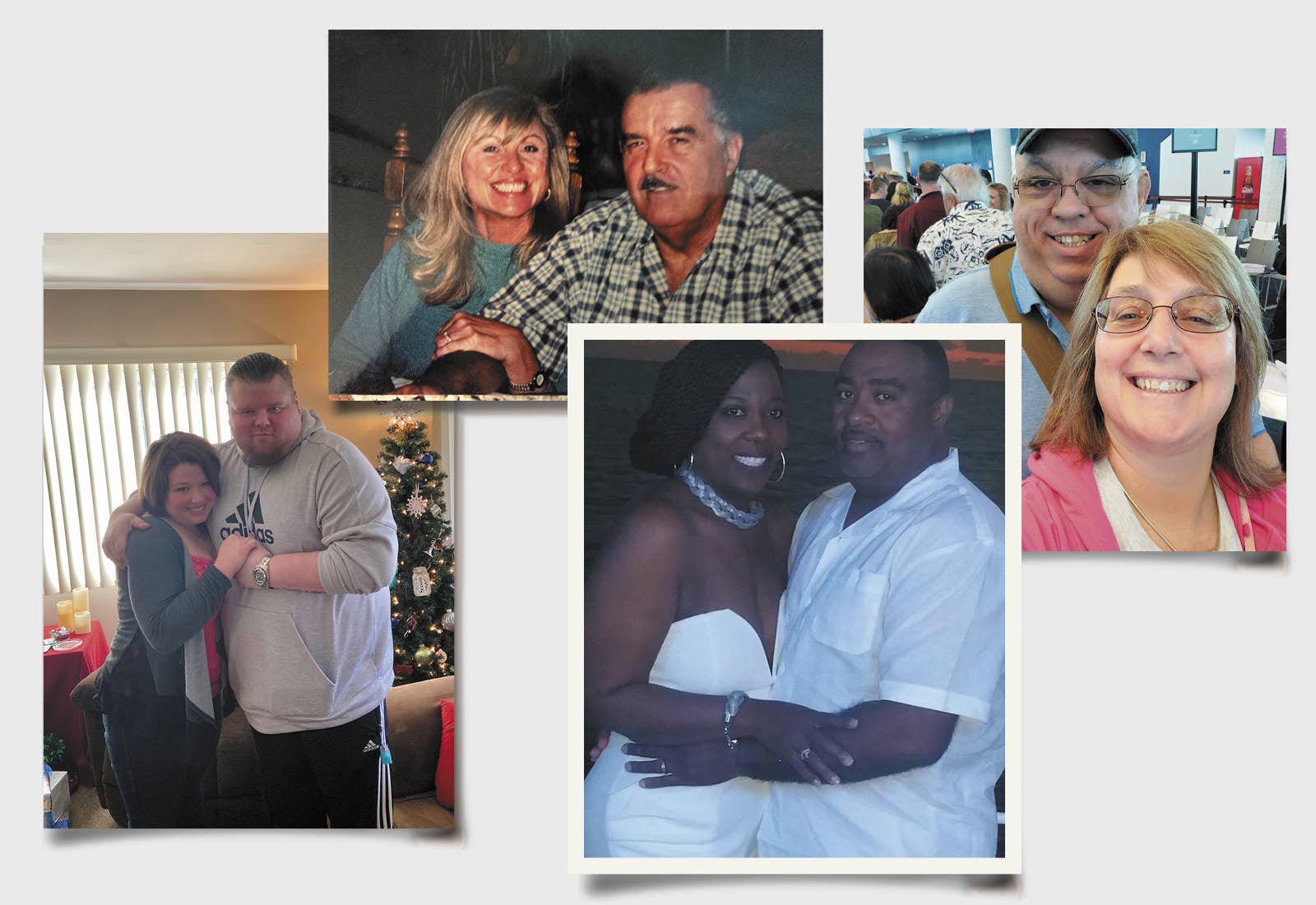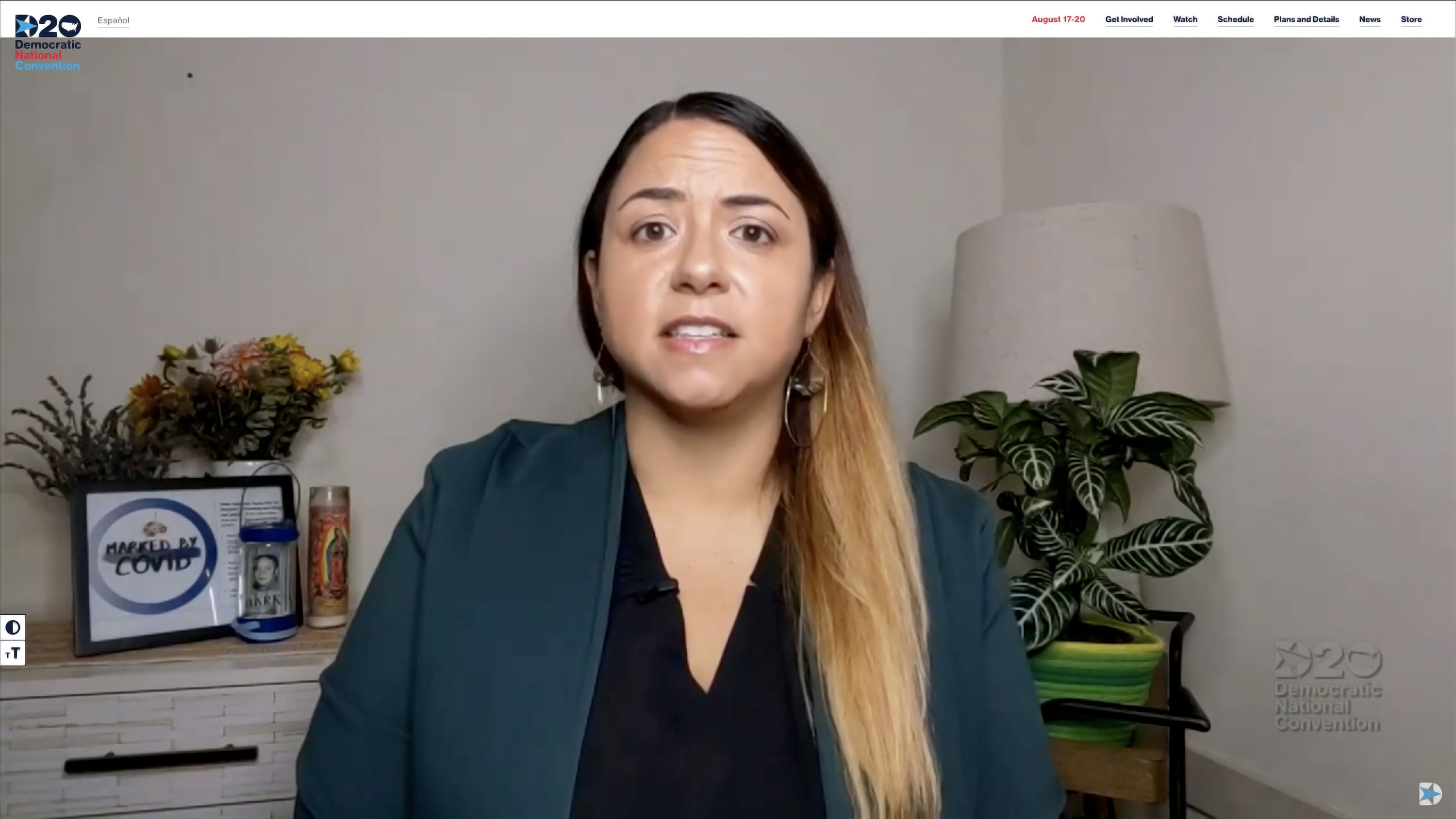
The journalists at BuzzFeed News are proud to bring you trustworthy and relevant reporting about the coronavirus. To help keep this news free, become a member and sign up for our newsletter, Incoming.
When Stacey Nagy’s 79-year-old husband David died from COVID-19 in July, she wasn’t just sad — she was angry. And in an obituary published in her local Texas paper, the Jefferson Jimplecute, on July 30, the 72-year-old said exactly why.
“Family members believe David’s death was needless,” Nagy wrote. “They blame his death and the deaths of all the other innocent people, on Trump, [Texas Gov. Greg] Abbott and all the other politicians who did not take this pandemic seriously and were more concerned with their popularity and votes than lives.”
"Dave did everything he was supposed to do, but you did not," she wrote. "Shame on all of you, and may Karma find you all!”
It has now been three months since David died, but Nagy’s pain has not subsided. She lives with just her dogs for company and has been terribly lonely. She has also had to contend with hate mail she received after the obituary went viral. She’s too worried about her safety to put a Joe Biden sign in her yard, but on Thursday, she hand-delivered her ballot to the Marion County clerk’s office, fueled by a desire to vote out the person she sees as responsible for her grief.
“Trump has no sympathy, no empathy, and he doesn’t think about all the people that have died and all the families the dead people have left behind,” Nagy told BuzzFeed News. “He is a sick, sick man, and I hope to god he is not reelected.”
“The whole country is full of sad people who’ve lost loved ones,” she said, “and he doesn’t care.”
The pandemic has been a difficult and destabilizing time for all Americans, but none more so than people whose loved ones have died from the coronavirus. The pain of losing a partner, though, is uniquely devastating. The death of a spouse is a world-shattering, isolating experience — especially during a deadly pandemic, when you cannot safely mourn with others and still have to worry about yourself or people you love getting sick.
As the country nears an election set to be in part a referendum on the Trump administration’s handling of a pandemic that has killed over 212,000 Americans, millions of grieving people — the loved ones left behind by the victims — will also be a voting bloc. People who followed all the rules of social distancing only to still have their spouses die have had to watch as the president and his allies shamelessly flout them. Worsening their grief is the haunting feeling that their partners’ deaths may have been preventable, that with stronger government action, with shutdown orders and mask mandates and travel bans being put in place sooner, their loved ones might still be alive.
“I feel Tim’s death was preventable,” said Andrea Mulcahy, 53, whose 52-year-old husband died in July. “I think if action had been taken a lot sooner by our government, both federal and state, he didn’t have to die.”
Mulcahy, who lives in Ocala, Florida, watched in shock over the past week as Trump himself became infected with the virus amid an outbreak in the White House caused by a flagrant disregard of social distancing guidance.
“With everything happening with the president having COVID and his cavalier reaction to it, I just got really, really angry,” she said. “His reaction to it was like a slap in the face for those of us who’ve been dealing with this.”
Fueled by anger, she has now connected with COVID Survivors for Change, an organization of coronavirus victims’ loved ones who are demanding politicians take better action to end the pandemic. She is planning to get involved however she can to make sure Trump is not reelected.
“[Trump] made you believe it could only affect elderly people, but my husband was 53 years old,” said Sonya Polk Hall, a 49-year-old in New Orleans, a member of a Facebook support group started by a Survivors for Change member.
Hall’s husband, Mark, died in April. The 30-year veteran of the New Orleans Police Department became sick with COVID-19 after he assisted in moving people experiencing homelessness into hotels. “He didn’t have a bad heart. He was not morbidly obese,” she said. “He just took a physical on March 18. He was perfectly healthy.”
While Hall doesn't particularly like either Biden or Trump, she did not know how she would vote in November until after her husband died.
“Because so many people follow [Trump] and believe in him, I think if he would have taken it more seriously, people would have taken it seriously,” she said. “I think it would’ve calmed down the death toll.”
“I had to pick the lesser of the evils, so to speak,” she said, “so that’s how [Biden] ended up with my vote.”

While some people whose partners died have channeled their anger into public denunciations of the president, others are simply too bereft, too exhausted from rebuilding their own lives to focus on rebuilding the country. The only people who know their pain are others whose spouses died from the coronavirus — and some are finding each other.
Shortly after 37-year-old Lew Berry died from COVID-19 in April in northern Indiana, his wife, Brianna Berry, 31, created a Facebook group, which she called “COVID-19 Widows and Widowers Support Group.” It now has 24 mostly women members — a relatively small number, but it has slowly grown over the past six months as more Americans die and more of their surviving partners seek support. Many members found the group organically, just searching on Facebook; others Berry found in separate support groups or through obituaries in the news.
The group has served as a safe haven for these people, said 28-year-old Tulsi Patel-Workoff of Huntington, New York, whose 33-year-old husband, Luke, died from the coronavirus in early April.
“It’s comforting. That’s really the only way I could put it,” Patel-Workoff said. “They’re going through everything I'm going through. I need that support from someone else going through it.”
“We call each other when we’re having a difficult time,” said Weehawken, New Jersey–based group member Natasha Gibbons-Hodkinson, 37, whose husband Gregory died in April, at age 47. “It’s been helpful to speak to others that feel what we’re experiencing.”
The group doesn’t talk politics too much, but they do regularly discuss how painful it’s been seeing individuals flouting social distancing guidelines and the government failing to enact measures that could have saved thousands of lives. Even worse has been dealing with outright COVID-19 conspiracy theorists, some of whom sent Berry cruel messages after her husband’s obituary appeared in the news.
“I’ve had multiple people tell me COVID is not real, blah blah blah,” Berry said. “One of the widows I talked to, she’s been hearing, ‘It’s all a big conspiracy theory and the hospitals are giving lethal injections.’ It’s crazy stuff, like, who says that to people?”
Michele Neff Hernandez, the founder of Soaring Spirits International, an organization that helps people dealing with the death of a spouse connect with one another, said the coronavirus news cycle makes things especially difficult for people whose partners died of COVID-19.
“What’s really been hard, I think, is news that it could’ve been better,” she said. “Let’s say the pandemic was handled in a different way and we shut down earlier, how many of their people might be alive? It’s a really hard thing to wrap your head around.”
Hernandez, whose husband died in a cycling accident in 2005, said the “what ifs” are a common thing for people whose spouses have died, including herself, to struggle with: What if he had biked down a different street? What if he left 20 minutes later?
“But in this case,” Hernandez said, “the world is saying ‘what if.’”

The grief of people whose partners died from the coronavirus is not made easier by the constant avalanche of news about the pandemic. This week, in particular, has been overwhelming for Berry, who started the Facebook group, given the flood of headlines about the outbreak at the White House. “It was kind of triggering, just all that in the news,” she said.
Berry watched in horror as the president took a joyride in an SUV with Secret Service agents to wave to fans outside his hospital. She knew firsthand how deadly the virus was, but the president seemed almost nonchalant about risking the exposure of others. Still, she hopes that, unlike her husband, Trump’s health improves. “You know, some people are saying he deserves to die from it, and while I don’t like him and don’t agree with him… I still wouldn’t wish that on my worst enemy,” she said.
But the president’s comments about the virus, even after he was sickened by it, are infuriating people whose spouses have died across the country. After Trump tweeted Monday that he was leaving the hospital and that people shouldn’t let fear of the virus “dominate” their life, Amanda Kloots, a fitness influencer whose husband Nick Cordero died of COVID-19 complications in July, spoke out publicly against the president. “Unfortunately it did dominate our lives, didn’t it?” Kloots said in an Instagram post. “It dominated Nick’s family’s lives and my family’s lives.”
“I cried next to my husband for 95 days watching what COVID did to the person I love. It IS something to be afraid of,” she continued. “After you see the person you love the most die from this disease you would never say what this tweet says.”

Some people whose loved ones have died from the virus are channeling their grief into political action. The most prominent people, though, have not been the spouses, but rather the children of COVID-19 victims.
That includes Kristin Urquiza, whose father died of COVID-19 in June and who went on to start the organization “Marked by COVID,” which organized a national “week of mourning” this week. In August, Urquiza spoke at the Democratic National Convention, saying in a video message that her father was a Trump supporter who believed the president’s downplaying of the virus, and as a result, he went to a bar with friends. “Once the president said it was safe and that we could open up and we were on the other side … my dad thought it was safe to start resuming normal activities,” Urquiza told BuzzFeed News. “That’s why he got sick, and unfortunately had to pay the ultimate price.”
For Urquiza, political activism is a major part of her grieving process. “There are some grief circles out there that currently exist around COVID that are strict about not being political, and I understand that, but I wouldn't be able to show up into that space,” Urquiza said. “My anger about the policy failure, the leadership failure, the lies, I can’t stifle that, so I’m creating this additional space for people who are ready to channel their pain into purpose.”
Fiana Tulip, a 40-year-old Texan now living in Brooklyn, also got involved in Marked by COVID shortly after her mom, Isabelle Papadimitriou, 64, died from the virus in July. Tulip said she was surprised by how quickly after the loss she felt motivated to take action. “It was so fast for me,” she said. “I spent the day that my mom died crying, but I also spent that day trying to get her back — which obviously isn’t reality, but that’s where my mind was going. And the only thing I could think of was a change in leadership.”
Tulip said she’s hoping with all her heart that Biden wins the election and that she thinks it would bring her a sense of peace and closure.
“I want to do this for my mom,” Tulip said
Chris Meagher, a spokesperson for the Democratic National Committee, told BuzzFeed News that his party does expect that people whose loved ones died from COVID will make up a significant voting bloc.
“People like Kristin Urquiza and others around the country who have lost family members are sharing their personal stories and raising their voices to talk about what’s at stake with this election,” Meagher said.
Trump's campaign said they were willing to campaign on the president’s record in handling the pandemic.
"As President Trump has said on multiple occasions, the loss of a single American life is tragic," spokesperson Courtney Parella said. "Coronavirus is a deadly enemy that has threatened us and our loved ones, but despite what the mainstream media and Democrats may peddle, President Trump and his administration faced this pandemic head-on."
Hernandez, the Soaring Spirits International founder, isn’t surprised that not too many people whose spouses died from COVID-19 have yet entered the political fray in prominent ways. She expects they have such little energy to spare beyond working to get through the day.
“You’ve seen people get fired up [after loss], like with Mothers Against Drunk Driving, or people who have experienced gun violence,” Hernandez said. “Sometimes they’re riled up and ready to go, and their grief fires that, but with COVID widows, it’s this exhausting, nonstop ride that you’re on and cannot get off — and they could still get sick themselves.”
Berry, too, is exhausted by the election news cycle. Alone in her home in northern Indiana, she can’t help but wonder if her husband might still be here if Trump had acted differently — if, say, he’d been as honest with the country about the deadliness of the virus as he had been privately with Bob Woodward.
“We know he knew [about the virus] in February, he’s admitted that. We could’ve probably saved thousands of lives if he would’ve just made a mask mandate, and I’m upset by that,” she said. “Maybe my husband would still be here. That is something I have to struggle with.”
Berry said she has previously identified as a moderate, having voted for a mix of Democrats and Republicans in the past — but Trump’s handling of the pandemic has pushed her firmly to the left.
“I cannot vote for someone,” she said, “who I blame for the death of my husband.” ●
